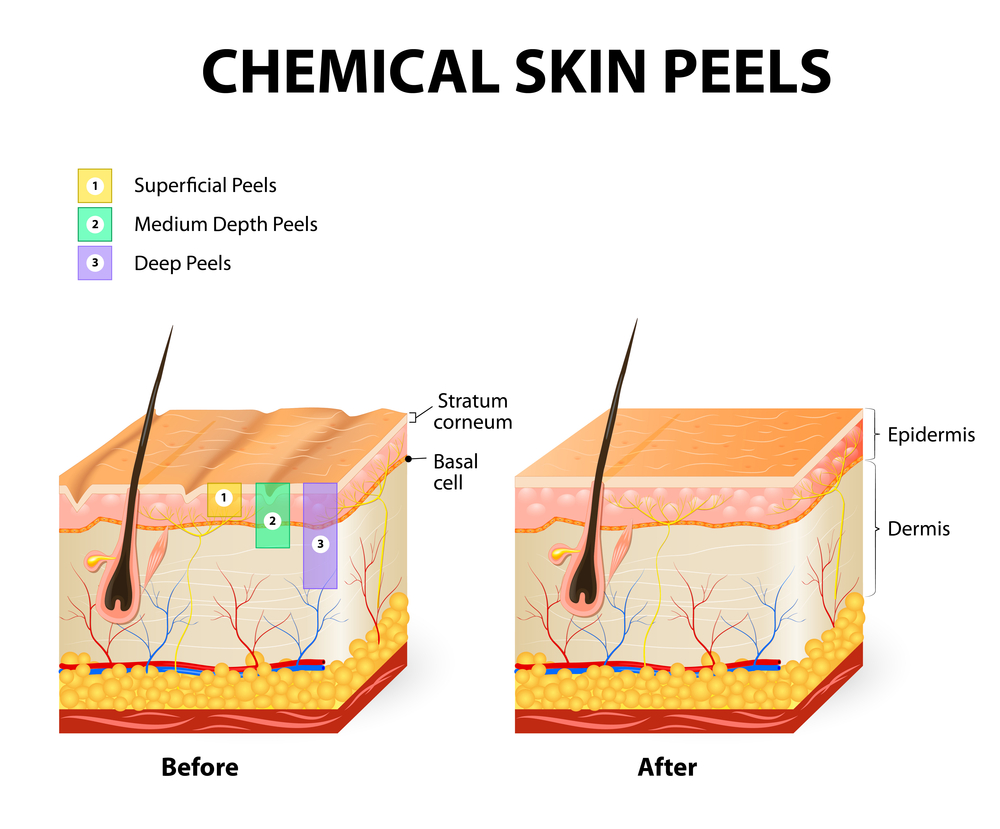Chemical Peels

Reveal Smoother, More Radiant Skin
If your skin has lost its luster, your complexion might look dull or faded. Chemical peels are a powerful exfoliating procedure that can remove dead and damaged skin cells to rejuvenate your appearance and unveil the smooth, healthy skin that waits underneath. As one of the most effective nonsurgical treatments available for a number of concerns, chemical peels can help you reclaim a more vibrant glow.
At Lucienne Salon & Medical Spa, chemical peels are an important part of our skin care arsenal. We use them to help our clients reveal a fresher face and achieve effortless beauty. Our team combines professional, quality formulas with personalized treatment plans, so you can find the right peel for your specific needs and individual skin type.
What Are Chemical Peels?
It might surprise you to learn that chemical peels have been around for centuries. The Egyptians used sour milk and crushed grapes to rejuvenate their skin, while later methods had dermatologists experimenting with different formulas to eliminate dark spots and freckles.
Chemical peels have come a long way since then, fine-tuned by new scientific discoveries and safer practices. However, the principle of removing dull or damaged skin cells to uncover a youthful complexion remains the same, and we continue to use more potent varieties of the ingredients found in early facial peels. Take lactic acid, for example — an alpha-hydroxy acid (AHA) still common in aesthetic treatments, was first derived from sour milk.
Today, chemical peels are still a top choice for improving the overall tone, texture and quality of your complexion. Patented solutions now allow the chemicals to penetrate the skin more safely and effectively, making them ideal for eradicating blemishes and producing a softer, smoother and healthier appearance.
How Do Chemical Peels Work?
Chemical peels work by using specially formulated ingredients to exfoliate the skin and remove the damaged outer layer that gives your complexion a dull appearance. When the solution is applied to the face or body, it sinks in and begins removing dead skin cells while bringing new ones to the surface. It also triggers the natural healing process and stimulates cellular renewal to reduce the signs of aging, acne or sun damage.
The majority of chemical peels achieve their results using AHAs (lactic acid, glycolic acid), BHAs (salicylic acid, citric acid) or TCA (trichloroacetic acid). Other formulations also use phenol to penetrate the skin more deeply. Depending on the strength of the solution, chemical peels usually fall into 3 different categories: light, medium and advanced.
What Can Chemical Peels Treat?
Chemical peels are most often applied to the face, but they can also be used on the body to exfoliate larger areas. There are many different types of chemical peels available that are able to treat a wide variety of concerns, such as:
- Fine lines and wrinkles
- Acne and acne scarring
- Skin discoloration
- Uneven tone or texture
- Sun damage
- Irregular pigmentation
- Certain types of scars
Chemical peels aren’t effective for deeper scars or more severe signs of aging — these and other concerns might be better addressed with dermaplaning, the Profound RF laser, or microneedling to achieve the best results. During your consultation, our team can develop a personalized treatment plan tailored to your specific needs.
Types of Chemical Peels
At Lucienne Salon & Medical Spa, we offer a comprehensive range of chemical peels in varying strengths to treat a number of common skin concerns.

Light/Superficial Peels
Light peels are recommended for clients with more sensitive skin and/or concerns that can be addressed with gentler exfoliation. They’re also a good choice for first-timers who are apprehensive about the treatment process. Light peels use milder ingredients like AHAs or BHAs to penetrate only the outermost layer of skin and provide a subtle glow. They also result in a brighter complexion, improved texture and smaller pores.
Medium Peels
Medium peels typically use TCA, higher concentrations of glycolic acid, or Jessner’s solution, which combines salicylic acid, lactic acid, and resorcinol to exfoliate the skin. They penetrate deeper than lighter peels and provide a moderately intensive treatment that’s effective for correcting the signs of aging, sun damage, acne scars and an uneven texture. In some cases, medium peels are also used to treat abnormal skin growths like actinic keratoses.
Advanced Peels
Advanced peels use potent ingredients that reach the deepest layers of the skin. Most formulas contain phenol, a chemical that exfoliates so effectively it can treat concerns like sun damage, hyperpigmentation, precancerous lesions, scarring and more severe signs of aging. It can also remodel damaged tissues and stimulate new collagen production to improve sagging to a certain degree. Although advanced peels deliver dramatic results after just one treatment, they require more downtime and aren’t suitable for all skin types.
Body Peels
Many of us pay close attention to blemishes or imperfections that develop on the face, but ignore similar concerns when they occur elsewhere. A body peel is designed to treat skin conditions that develop on the arms, legs, hands, back and abdomen. It works the same way as other chemical peels by removing dead or damaged skin cells to improve the overall tone and texture of treated areas. Body peels typically use mild to medium-strength ingredients like AHAs or BHAs that can be safely applied in larger amounts.
Chemical Peels Pricing
60 min — $140
60 min — $170
60 min — $200
Sm/med area — $280
Large area —$360
Ideal Candidates for Chemical Peels
Chemical peels come in varied strengths and formulations, making them highly customizable and suitable for clients with nearly all skin types. However, some people may have a higher risk of hyperpigmentation or scarring after treatment, so it’s important to meet with a qualified professional to determine if chemical peels are right for you. During your consultation, we’ll thoroughly evaluate your skin and ask about any sensitivities, conditions or allergies you may have to ensure a safe and effective treatment. Typically, chemical peels are ideal for those who:
- Want to restore a glowing, youthful complexion
- Have concerns that can be treated with chemical peels
- Aren’t prone to keloids or abnormal scarring
- Not taking any medications that increase skin sensitivity (such as Accutane)
- Don’t have a history of hyperpigmentation
If you’re not a candidate for chemical peels, our team can recommend other procedures for achieving your goals and develop a personalized skin care plan tailored to your needs. Additionally, we can also combine your treatment with other rejuvenating methods such as microneedling or microdermabrasion for more comprehensive results.
Chemical Peel Treatment Process
The procedure steps for each type of chemical peel are similar no matter which formulation is used. First, our aesthetic experts will cleanse your skin of any dirt, oil or debris to provide an ideal canvas for treatment. Then, the peeling solution will be applied to the face or body and left on for an appropriate amount of time. Depending on the strength of the peel, you might feel some tingling as it begins to rejuvenate your skin, but this is generally a mild sensation. For deeper peels, a topical anesthetic may be used to ensure your comfort.
Once the peel has been given enough time to deliver the desired effect, it will be neutralized and rinsed off your skin. Your treatment may be followed with the application of a moisturizer or other soothing product, as well as further instructions for at-home care. The entire process takes less than an hour to complete, and our practitioner will stay in the room with you the whole time to monitor your progress and ensure there are no adverse reactions.
Recovery & Results
Your results and recovery will depend on which type of peel was used. Light peels require virtually no downtime and allow you to immediately resume your normal activities. Your skin may appear to be dry, red and mildly irritated after your appointment, but otherwise, few signs of treatment are noticeable. Light peels make a great addition to your monthly skin care routine and can help you maintain a glowing complexion.
In contrast, advanced peels penetrate deeper into the skin and require significantly more downtime and aftercare. The healing process involves redness, swelling, crusting and flaking that can last for several weeks, but you’ll receive detailed instructions for protecting your sensitive skin to ensure a smooth recovery. Once your results emerge, your complexion will be noticeably smoother, brighter and more youthful-looking. Compared to other peels, only one treatment is needed for a dramatic improvement in your skin’s tone and texture.
Schedule a Consultation
We all long for radiant, youthful skin, and a chemical peel at Lucienne Salon & Medical Spa in South Jordan, Utah, can make that happen. To learn more about chemical peels and how we can help you rejuvenate a dull, tired-looking complexion, call us today at 801-280-9990 or click here to book an appointment with one of our qualified skin care professionals.

